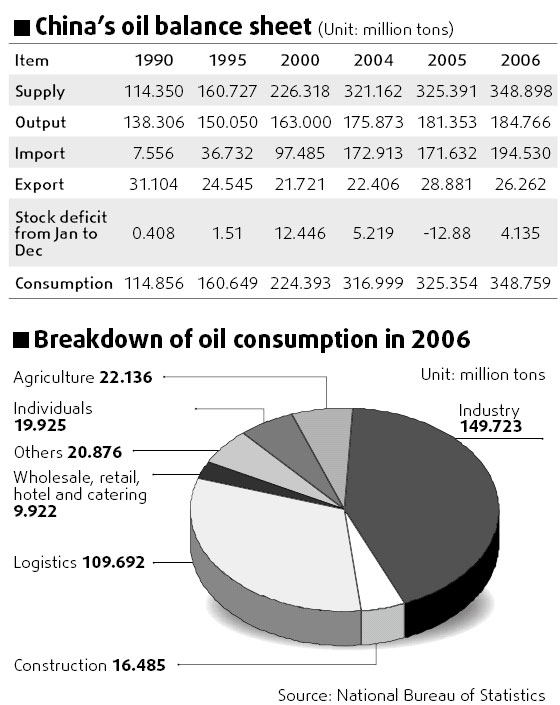Oil impact
Updated: 2008-02-18 15:06
Consequently, consumption of gasoline and diesel oil rose sharply. In 2006, 51.7 and 116.3 million tons were consumed respectively, up 49.1 and 73.5 percent from 2000.
Urbanization is also speeding up. With the development of a market economy, a growing amount of surplus rural labor has flooded the urban areas. From 2001 to 2006, Chinese urban dwellers developed from 480.6 million to 577.1 million. In 2006, urban dwellers made up 43.9 percent of the total population; the 2001 figure was 34.7 percent. Consequently, a large number of new cities are emerging.
However, urbanization requires an enormous amount of fuel. A city dweller consumes three times as much energy as a rural resident on average.
As their numbers dwindle, rural residents are increasingly turning to highly efficient agricultural machinery.
As of the end of 2006, every 100 rural families possessed 1.83 automobiles and 23.45 tractors. These machines are generally high consumers of electricity and diesel oil.
Rural living itself is now becoming much more urbanized. Rural residents are earning more money to afford durable goods. In 2006, rural residents' ownership of refrigerators, computers and motorcycles increased 82.6, 480.9 and 103.2 percent respectively compared with 2000.
Finally, China's current industrial structure is inappropriate for heavy industry to take a dominating position. However, investment in energy-consuming industries continues to grow. Secondary industry contributed 44.8 percent to China's GDP in 2002, and the figure rose to 47.5 percent in 2005 and 48.7 percent in 2006. Consumption of oil and other fuels is unprecedented.
Unavoidable challenge
It is generally believed that the impact of high oil prices on China's economy is unavoidable because the imbalance between supply and demand cannot be solved at its root.
First, the demand in the international oil market remains high. Besides, oil is priced in the US dollar. Due to the greenback's continuous depreciation, oil prices are very likely to keep rising.
Secondly, current oil consumption in China surpasses production. Although China has made great efforts to increase oil production - growing from 16.3 million tons in 2000 to 18.48 million tons in 2006 - a growing amount of imported oil is needed. According to domestic experts, around 2020, China will have to import 300 million tons of oil, or half of its total demand.
Thirdly, extensive economic growth continues. China is now in the middle of its industrialization with too large a proportion of high energy-consuming industries. China demands a huge amount of energy to support its place as factory to the world.
Finally, the impact on oil-related industries will continue. Oil and its downstream products are essential raw materials. Escalating oil prices will bring up the production costs of these industries. If they fail to transfer costs to customers, they will suffer profit losses and perhaps bankruptcy.
Active responses
However, as long as measures are taken, these unavoidable impacts can be reduced to an acceptable level.
In order to achieve the goal of saving 20 percent energy during the 11th Five-Year Plan (2006-2010), it is of key importance to reduce secondary industry's consumption since it is the major consumer.
People's awareness about saving energy should be strengthened. Utilization efficiency should also be improved. Stricter entry admittance should be given to those backward enterprises with high consumption and pollution.
In addition, a fuel tax is a practical means to force enterprises to adopt advanced technology and turn to explore new and clean energy.
Furthermore, China should carry out oil price reform according to international markets fluctuation, and allow the price lever to regulate energy consumption.
Consideration should also be given to disadvantaged groups and public service industries. Raise the standard of social security and hand out temporary subsidies to those who have been badly affected by rising liquid gas prices. College canteens should also receive support from the government to guarantee students are not burdened. The cost of public traffic and chemical fertilizers should be kept at an acceptable level for they are closely related with peoples' daily lives and agricultural production.

|
||
|
|

